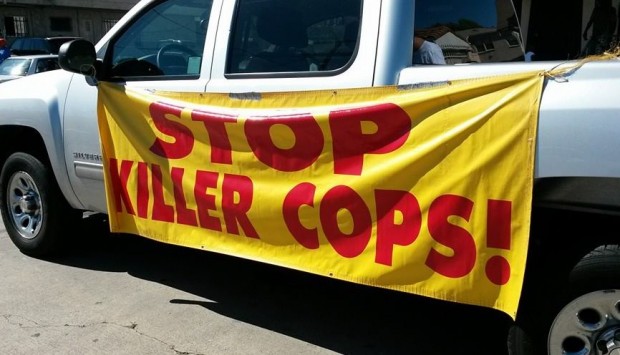 He became an icon for all the wrong reasons and he led a rather troubled life, so his tragic death at the age of 47 is even sadder. The best way to pay tribute to him is by doing what we can to try and get along.
He became an icon for all the wrong reasons and he led a rather troubled life, so his tragic death at the age of 47 is even sadder. The best way to pay tribute to him is by doing what we can to try and get along.
One People’s Project
LOS ANGELES, CA—Just a month and a half after observing the twentieth anniversary of the Los Angeles Rebellion that was sparked by his videotaped beating at the hands of police officers and their subsequent acquittal, Rodney King was found dead in his swimming pool by his fiancée, ABC News has reported. He was 47.
Rialto, CA police, who received a call from the fiancée at 5:25 AM, say when they arrived on the scene, he was at the bottom of his swimming pool and efforts to revive him were unsuccessful. He was taken to Arrowhead Regional Medical Center in Colten, CA where he was pronounced dead. Police say there is no evidence of foul play, and details are still forthcoming at the time of this writing.
On March 3, 1991, police officers in the San Fernando Valley were involved in what they said was a high-speed chase with a Hyundai that King was driving. After eight miles they ordered King and his passengers out of the vehicle and ordered them all to lie on the ground. Police officers on the scene said that as King resisted arrest, officers began striking him with his baton. Unbeknownst to the officers however a private citizen named George Halliday began videotaping the beating from his apartment near the intersection of Foothill Blvd and Osborne St. When he contacted the police about a videotape of the incident but was dismissed, but when he went to KTLA television with his videotape, they broadcast it on air in its entirety.
The broadcast of the video resulted in an international outcry, putting police departments around the world under the public microscope. The Los Angeles Police Department, then under the command of the late and controversial Chief Darryl M. Gates, came under intense fire because of this incident. It became even more intense when on April 29, 1992, the four officers that were indicted for the videotaped beating were acquitted of all charges, sparking a volcanic anger in the black neighborhoods of Los Angeles that became known as the Los Angeles Rebellion for the next three days. 56 persons lost their lives in that time and billions of dollars in financial losses was incurred. In the wake of the Rebellion, King pleaded for calm in a public statement uttering a now famous line: “Can’t we all get along?”
The King beating and the Los Angeles Rebellion became a staple in pop culture and is still a bone of contention particularly between conservatives and the black community. A federal trial the following year resulted in the conviction of two of the officers, who both received 32-month sentences. King sued the City of Los Angeles, and received a $3.8 million settlement.
In the years that followed King still struggled with alcohol and went into rehabilitation several times. He had been arrested a dozen times, the most recent being in February for reckless driving. Despite this, Capt. Randy Deanden of the Rialto Police Department told Alex Witt on MSNBC there he has maintained a good relationship with the police and there has been no recent incidents of problems with him.
During the observances of the twentieth anniversary of the Rebellion, King had been interviewed, and noted how the now current case of the Trayvon Martin killing had parallels to his own experience. In a statement, King said he was “grieving for Trayvon Martin” and stated how the scream on the audio of George Zimmerman’s 911 call reminded him of his own screaming during his beating by the LAPD.
Just a few months ago, King and co-author Lawrence Spagnola released a book entitled, “The Riot Within: My Journey from Rebellion to Redemption,” chronicling his life before, during and since the now-notorious videotaped beating. During a book signing in April, he was interviewed by Fox News and said he wants to be known more for his “Can we get along?” statement, and asked that everyone ponders that question. “This is how I want to be remembered when I’m dead and gone,” he said.


More Stories
Muhammad Ali – Rest in Peace
WHITE SUPREMACIST JOYCE WEIGEL DEAD
TYLER COLE, ROT IN HELL!